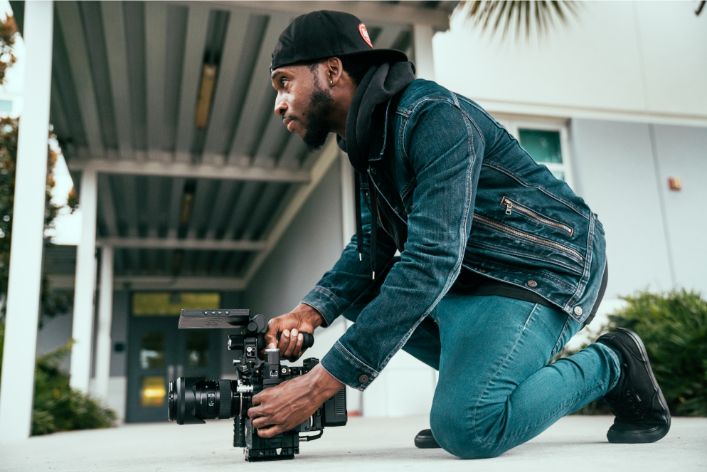Introduction
Nigeria’s film industry, commonly known as Nollywood, is one of the fastest-growing film industries in the world. Nollywood movies are popular not only in Nigeria but also globally. Film directors play a vital role in Nollywood by translating scripts into movies that portray the African culture and lifestyle.
A film director is responsible for making creative decisions about the movie production process. They coordinate and supervise the crew, actors, and every aspect of the movie’s production, from the initial idea to the final product, including scripting, casting, shooting, editing, and the overall artistic style of the movie.
The purpose of this blog post is to highlight the career of a film director in Nollywood and how to become a successful one. The post aims to inspire young, ambitious individuals interested in this field, enlighten them about the requirements and challenges, and show them how to thrive in Nollywood.
In essence, the Nigerian film industry is an excellent platform for aspiring filmmakers. Nollywood has given birth to many great film directors who have become renowned and successful beyond Nigeria’s borders.
Therefore, if you have a passion for film and storytelling, consider a career as a film director in Nollywood, and with hard work, perseverance, and dedication, nothing can stop you from achieving your dreams.
Read: Unveiling Nigeria’s Most Influential Media Personalities
Qualifications and Education
Are you interested in becoming a film director in Nigeria’s booming film industry, Nollywood? A career in film directing requires a particular set of skills and qualifications to excel in the field. In this article, we will discuss the qualifications and education required for this role.
Necessary qualifications for a career as a film director in Nollywood
- A bachelor’s degree in film or a related field is essential for a career in film directing.
- An in-depth understanding of the screenplay, cinematography, lighting, sound and editing, and other technical aspects of filmmaking.
- Excellent communication, leadership, and interpersonal skills.
- A strong portfolio or reel that showcases a director’s ability to translate their creative vision into a compelling film.
- A working knowledge of the Nigerian film industry and its trends is also critical.
Types of education and training required:
Several types of education and training are required for a career in film directing, some of which include:
- A bachelor’s degree in film studies, communication, or related fields from a reputable university.
- Internship programs or apprenticeships with film production companies, where aspiring directors can gain practical experience in filmmaking and learn on the job.
- Attending film festivals, workshops, seminars, and other industry events to stay current with the latest film-making trends and meet new people.
Schools and courses available in Nigeria for film directing:
Nigeria has some reputable institutions that offer film-making courses and related fields. Some of them are:
- Nigerian Film Institute (NFI) Jos: Offers programs like Certificate in Film Production Techniques and Diploma in Film Art.
- Pan-Atlantic University’s School of Media and Communication Lagos: Offers a bachelor’s degree in Communication & Media Studies with an option in filmmaking.
- Del-York Film Academy Lagos: Offers an intense training program in film directing, focusing on the craft of directing and storytelling through film.
- University of Ilorin: Offers a bachelor’s degree in Theatre, where students specialize in directing for theatre and film, among others.
In review, becoming a film director in Nigeria’s Nollywood requires a set of skills and qualifications that need to be cultivated and honed over time. A good education, practical film-making experience, and staying current with the latest industry trends are essential steps to developing a successful career in this field.
Read: Landing your First IT Job in Nigeria: A How-To Guide
Skills and Personal Traits
As a film director, various attributes are important for achieving success in the Nigerian film industry, Nollywood. These include essential skills and personal traits that are necessary for effective leadership, creativity, and innovation during film production.
Essential Skills
- Leadership Skills: As a film director, you are the chief creative officer in charge of managing a team of cast and crew members. Therefore, it’s crucial to possess leadership skills such as the ability to motivate and inspire others, communicate effectively, delegate tasks, and make decisive decisions.
- Technical Skills: A good film director should possess technical skills such as thorough knowledge of cameras, lighting, and sound equipment. This knowledge ensures that the director can effectively communicate creative ideas to the technical team, ensuring the production is completed with high-quality sound and video.
- Storytelling Skills: Being able to tell a compelling story is critical. You should be able to translate the screenplay into a visual story, crafting each shot to serve the narrative. This requires a deep understanding of storytelling techniques such as plot development, character arcs, and cinematography
. - Problem-solving Skills: Rapid problem-solving is critical when productions face issues such as budget constraints, faulty equipment, or unforeseen circumstances. A film director needs to be able to quickly problem-solve and come up with viable solutions.
Personal Attributes
- Creativity: A strong creative vision is fundamental in film directing. A film director should have original ideas and be imaginative to deliver compelling and entertaining films.
- Adaptability: The film industry is dynamic; you should be able to work under different circumstances, switching projects or adapting to unforeseen interruptions.
- Perseverance: Filming is often a long and challenging process. Film directors should have the ability to remain focused on the project’s goals and persist through setbacks.
- Collaborative Spirit: Film productions are highly collaborative, and the director should foster a collaborative environment. These collaborations may range from working with seasoned actors to first-time professionals.
Examples of Established Film Directors in Nollywood and Their Skills/Assets
- Kunle Afolayan: Known for his attention to detail and excellent storytelling abilities, Kunle is one of Nollywood’s most renowned filmmakers. He is talented at impressively blending traditional African aesthetics and modern Western elements into stunning film pieces.
- Tunde Kelani: Tunde is another legendary Nollywood director with over four decades of experience; he has established himself as a master of the craft. He is renowned for his artistic approach, exceptional storytelling, and impressive productions.
- Kemi Adetiba: Kemi is a young and vibrant filmmaker who infuses originality and creativity into her films. Her expertise in the technical aspects of filmmaking has earned her several accolades, and her storytelling approach mirrors a perfect blend of youthful energy and traditional African stories.
In short, the film directing profession cuts across possessing essential skills and personal attributes to achieve success. The Nigerian film industry, Nollywood, has witnessed growth in recent years, and directors such as Kunle Afolayan, Tunde Kelani, and Kemi Adetiba continue to leave a significant mark in the industry.
Read: Overview: The Entertainment & Media Industry in Nigeria
Challenges of the Job
Nigeria’s Nollywood is one of the largest film industries in the world, producing hundreds of movies every year. With this level of output, it’s easy to imagine that film directors in the industry are facing numerous challenges. Here are some common obstacles faced by film directors in Nollywood:
- Budget Constraints
Due to the fact that many Nollywood films are low-budget, the directors are left to work with very limited resources. This means that they have to work harder to create visuals that meet their vision. - Time Constraints
Movies are produced in a very short period of time in Nollywood, leaving less time for pre-production, production, and post-production activities. This puts directors under immense pressure to make every minute count. - Talent Pool Limitations
Nollywood is a relatively new industry, and as such, has a limited talent pool to select from. This means that directors may need to work with inexperienced cast and crew members who may struggle to bring their vision to life.
Despite these challenges, there are strategies that film directors have used to overcome them. Some of these strategies include
- Creative Financing
Creative financing is a method of funding a movie outside the traditional studio or investor model. This strategy can help directors overcome budget constraints by allowing them to raise money from different sources. - Efficient Time Management
Time management is a key strategy that directors use to stay on top of their production schedules. They prioritize their tasks, delegate responsibilities, and communicate effectively with their team members to save time. - Collaboration with Skilled Professionals
To overcome talent pool limitations, directors collaborate with experienced professionals who can help bring their vision to life. This could include working with seasoned actors, cinematographers, or editors.
Real-life experiences of film directors regarding setbacks and how they bounced back
Kemi Adetiba, the director behind the box office hit “The Wedding Party”, has faced several setbacks in her career. In a recent interview, she recounted an experience where her movie was rejected by a Nigerian film festival.
Rather than give up, she worked harder and eventually premiered the movie at the Toronto International Film Festival. This opened doors for her, and she went on to become one of the biggest directors in the industry.
Another director, Mildred Okwo, who is known for her work on “The Meeting” and “La Femme Anjola”, also faced significant setbacks.
After her first movie flopped, she took a break and spent time learning more about her craft. When she returned to the industry, she had a fresher perspective and was able to create films that resonated with audiences.
Basically, being a film director in Nollywood can be challenging, but it’s important to remember that setbacks are a part of the journey. By employing smart strategies and staying resilient, directors can overcome the obstacles they face and create impactful movies that resonate with audiences.

Earnings and Career Outlook
When it comes to financial gains, a film director’s career in Nollywood can be quite lucrative. However, the actual earnings can vary depending on several factors such as experience, type of production, and popularity of the movie.
According to reports, a beginner director in Nollywood can make between N500,000 ($1,300) to N1 million ($2,600) per movie. However, if the director is more experienced, their earnings can increase to N3 million ($7,800) and above per movie.
Compared to other professionals in the Nigerian film industry, directors are among the highest earners. Actors are reported to make around N500,000 ($1,300) to N1 million ($2,600) per movie, while screenwriters can earn between N100,000 ($260) to N200,000 ($520) per script.
In terms of career progression opportunities, a film director in Nollywood can move up the ladder to become a producer or even an executive producer of a movie. This means they can have more creative control over the production and also earn more money.
Additionally, some directors choose to establish their own production companies and become entrepreneurs in the industry.
This allows them to have more control over the content they produce and also to earn more money from their business ventures.
Another aspect to consider for the career outlook of a film director in Nollywood is the growth of the industry itself. Nollywood is currently the second-largest film industry in the world, and it continues to expand every year.
This means there are more opportunities for directors to showcase their talent and also to earn more money.
Overall, a career as a film director in Nollywood can be both creatively fulfilling and financially rewarding. With the right experience and skills, directors can take advantage of the growth opportunities in the industry and advance their careers to the next level.
Read: Understanding the Role of Geoscientists in Nigeria’s Oil Industry
Steps to Becoming a Film Director in Nollywood
Becoming a film director in Nollywood, the Nigerian film industry, requires passion, dedication, and hard work. It is a highly competitive field, but with the right approach, you can launch a successful career in Nollywood. Here is a sequence of steps to follow:
Education
Like any other profession, education is crucial to becoming a film director. You need to have a solid foundation in film production, including screenwriting, cinematography, editing, and directing.
Consider enrolling in a film school or taking courses in these areas to learn the essential skills needed to become a film director.
Build a Network
Networking is essential in the film industry. You need to build relationships with other professionals and connect with like-minded individuals who share your passion for film.
Attend film festivals, industry events, and workshops to meet other filmmakers, actors, and producers. Networking can open doors to opportunities and help you gain valuable experience and exposure.
Gain Experience
Experience is crucial to becoming a successful film director. Start by working as an assistant director or production assistant to gain hands-on experience on set. This will help you learn the ropes, build your portfolio, and gain valuable industry contacts.
You can also work on short films, music videos, or other low-budget productions to gain experience and build your reputation.
Create Your Own Content
If you want to become a film director, you need to create your own content. Write and direct your short films, music videos, or web series to showcase your talent and vision.
This will help you build your portfolio and create a body of work that demonstrates your skills and style as a director.
Get Your Foot in the Door
Getting your foot in the door in Nollywood can be challenging, but persistence is key. Submit your work to film festivals, attend auditions, and connect with producers and directors on social media or through referrals.
You can also consider working as an intern or production assistant on a Nollywood production to gain industry experience and connections.
Practical Tips for Aspiring Film Directors
- Be persistent and resilient in pursuing your dream of becoming a film director.
- Stay up-to-date with industry trends and seek out opportunities to learn and grow as a filmmaker.
- Collaborate with other creatives and build a team that shares your vision and passion.
- Be open to feedback and constructive criticism to improve your craft.
- Build a strong online presence to showcase your work and connect with industry professionals and fans.
Becoming a film director in Nollywood is a challenging but rewarding journey. By following these steps and practical tips, you can position yourself to launch a successful career in Nigeria’s growing film industry.
Conclusion
Being a film director in Nigeria’s Nollywood industry is a challenging yet rewarding career path.
It requires passion, creativity, and hard work to succeed in the highly competitive industry. As highlighted in this blog post, a film director’s responsibilities range from script interpretation to directing and editing.
Although the industry has its challenges, including funding and piracy, many young talents still aspire to become film directors in Nollywood.
From my personal opinion and reflection, Nollywood has grown in leaps and bounds, and the industry is poised for greater things in the future.
As a final piece of advice, I would encourage readers who aspire to become film directors to take the bold step and pursue their dreams. With an ever-growing audience, Nollywood provides a platform for upcoming directors to showcase their skills and make a significant impact on the industry.




